Ethical Leadership Practices and Child Development: An Analysis
VerifiedAdded on 2020/09/17
|10
|2787
|30
Essay
AI Summary
This essay examines the critical role of ethical leadership in early childhood settings, emphasizing its impact on child development and education. The essay discusses the responsibilities of ethical leaders in guiding children towards moral values, justice, respect, and honesty, and highlights the importance of creating a positive and supportive environment. It explores the influence of ethical leaders, such as teachers, on children's beliefs and behaviors, and the significance of early childhood frameworks like the UK's EYFS and Malaysia's education system. The essay also addresses the need for ethical leadership practices in schools and the importance of clear vision, parental and governmental support. The essay further discusses the importance of ethical leaders in promoting children's well-being, lifelong learning, and technological understanding, while also considering the influence of ethnic composition on educational policies and the skills required for ethical leadership. Overall, the essay underscores the significance of ethical leadership in shaping children's future and contributing to societal and economic development.
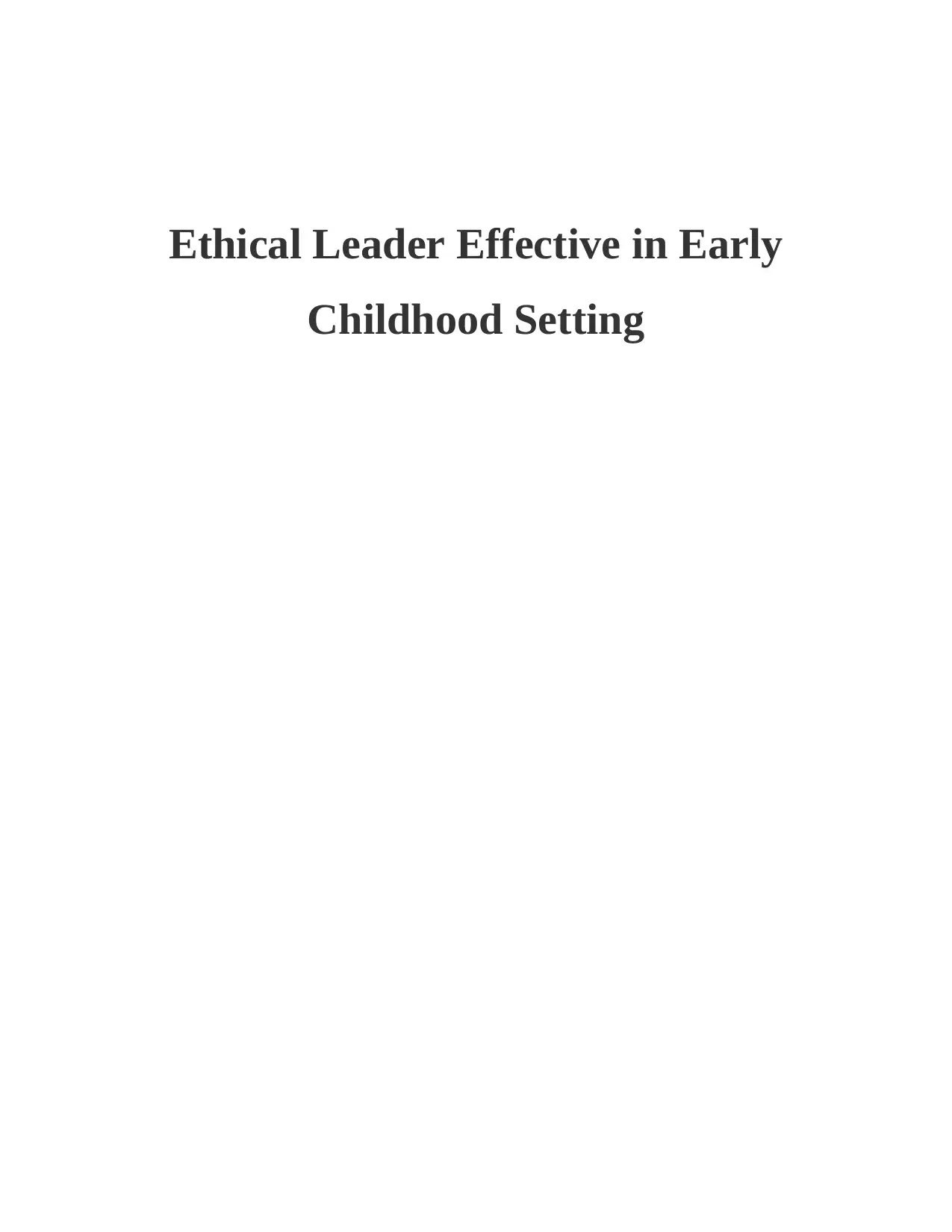
Ethical Leader Effective in Early
Childhood Setting
Childhood Setting
Paraphrase This Document
Need a fresh take? Get an instant paraphrase of this document with our AI Paraphraser

Table of Contents
INTRODUCTION...........................................................................................................................1
MAIN BODY...................................................................................................................................1
CONCLUSION................................................................................................................................6
REFERENCES................................................................................................................................7
INTRODUCTION...........................................................................................................................1
MAIN BODY...................................................................................................................................1
CONCLUSION................................................................................................................................6
REFERENCES................................................................................................................................7
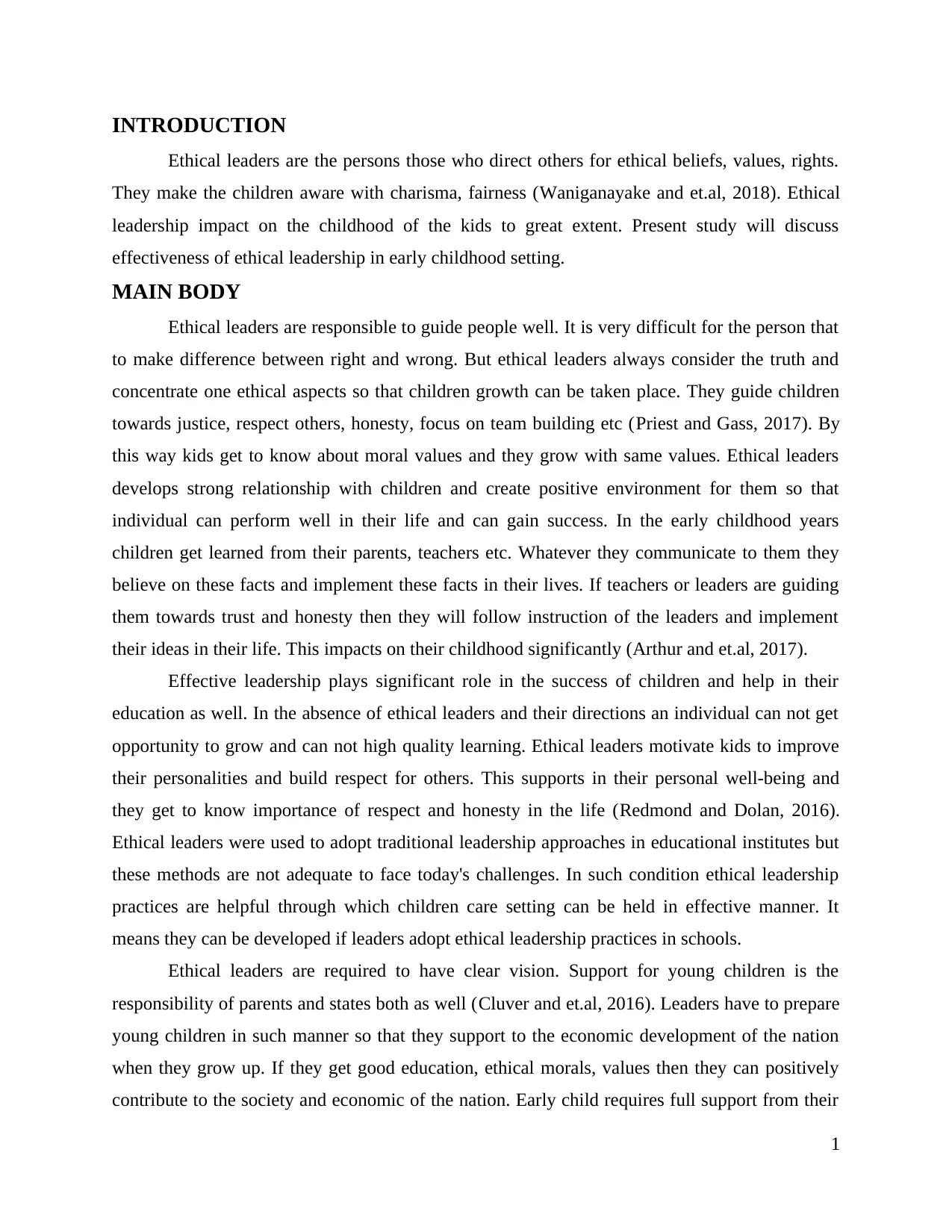
INTRODUCTION
Ethical leaders are the persons those who direct others for ethical beliefs, values, rights.
They make the children aware with charisma, fairness (Waniganayake and et.al, 2018). Ethical
leadership impact on the childhood of the kids to great extent. Present study will discuss
effectiveness of ethical leadership in early childhood setting.
MAIN BODY
Ethical leaders are responsible to guide people well. It is very difficult for the person that
to make difference between right and wrong. But ethical leaders always consider the truth and
concentrate one ethical aspects so that children growth can be taken place. They guide children
towards justice, respect others, honesty, focus on team building etc (Priest and Gass, 2017). By
this way kids get to know about moral values and they grow with same values. Ethical leaders
develops strong relationship with children and create positive environment for them so that
individual can perform well in their life and can gain success. In the early childhood years
children get learned from their parents, teachers etc. Whatever they communicate to them they
believe on these facts and implement these facts in their lives. If teachers or leaders are guiding
them towards trust and honesty then they will follow instruction of the leaders and implement
their ideas in their life. This impacts on their childhood significantly (Arthur and et.al, 2017).
Effective leadership plays significant role in the success of children and help in their
education as well. In the absence of ethical leaders and their directions an individual can not get
opportunity to grow and can not high quality learning. Ethical leaders motivate kids to improve
their personalities and build respect for others. This supports in their personal well-being and
they get to know importance of respect and honesty in the life (Redmond and Dolan, 2016).
Ethical leaders were used to adopt traditional leadership approaches in educational institutes but
these methods are not adequate to face today's challenges. In such condition ethical leadership
practices are helpful through which children care setting can be held in effective manner. It
means they can be developed if leaders adopt ethical leadership practices in schools.
Ethical leaders are required to have clear vision. Support for young children is the
responsibility of parents and states both as well (Cluver and et.al, 2016). Leaders have to prepare
young children in such manner so that they support to the economic development of the nation
when they grow up. If they get good education, ethical morals, values then they can positively
contribute to the society and economic of the nation. Early child requires full support from their
1
Ethical leaders are the persons those who direct others for ethical beliefs, values, rights.
They make the children aware with charisma, fairness (Waniganayake and et.al, 2018). Ethical
leadership impact on the childhood of the kids to great extent. Present study will discuss
effectiveness of ethical leadership in early childhood setting.
MAIN BODY
Ethical leaders are responsible to guide people well. It is very difficult for the person that
to make difference between right and wrong. But ethical leaders always consider the truth and
concentrate one ethical aspects so that children growth can be taken place. They guide children
towards justice, respect others, honesty, focus on team building etc (Priest and Gass, 2017). By
this way kids get to know about moral values and they grow with same values. Ethical leaders
develops strong relationship with children and create positive environment for them so that
individual can perform well in their life and can gain success. In the early childhood years
children get learned from their parents, teachers etc. Whatever they communicate to them they
believe on these facts and implement these facts in their lives. If teachers or leaders are guiding
them towards trust and honesty then they will follow instruction of the leaders and implement
their ideas in their life. This impacts on their childhood significantly (Arthur and et.al, 2017).
Effective leadership plays significant role in the success of children and help in their
education as well. In the absence of ethical leaders and their directions an individual can not get
opportunity to grow and can not high quality learning. Ethical leaders motivate kids to improve
their personalities and build respect for others. This supports in their personal well-being and
they get to know importance of respect and honesty in the life (Redmond and Dolan, 2016).
Ethical leaders were used to adopt traditional leadership approaches in educational institutes but
these methods are not adequate to face today's challenges. In such condition ethical leadership
practices are helpful through which children care setting can be held in effective manner. It
means they can be developed if leaders adopt ethical leadership practices in schools.
Ethical leaders are required to have clear vision. Support for young children is the
responsibility of parents and states both as well (Cluver and et.al, 2016). Leaders have to prepare
young children in such manner so that they support to the economic development of the nation
when they grow up. If they get good education, ethical morals, values then they can positively
contribute to the society and economic of the nation. Early child requires full support from their
1
⊘ This is a preview!⊘
Do you want full access?
Subscribe today to unlock all pages.

Trusted by 1+ million students worldwide
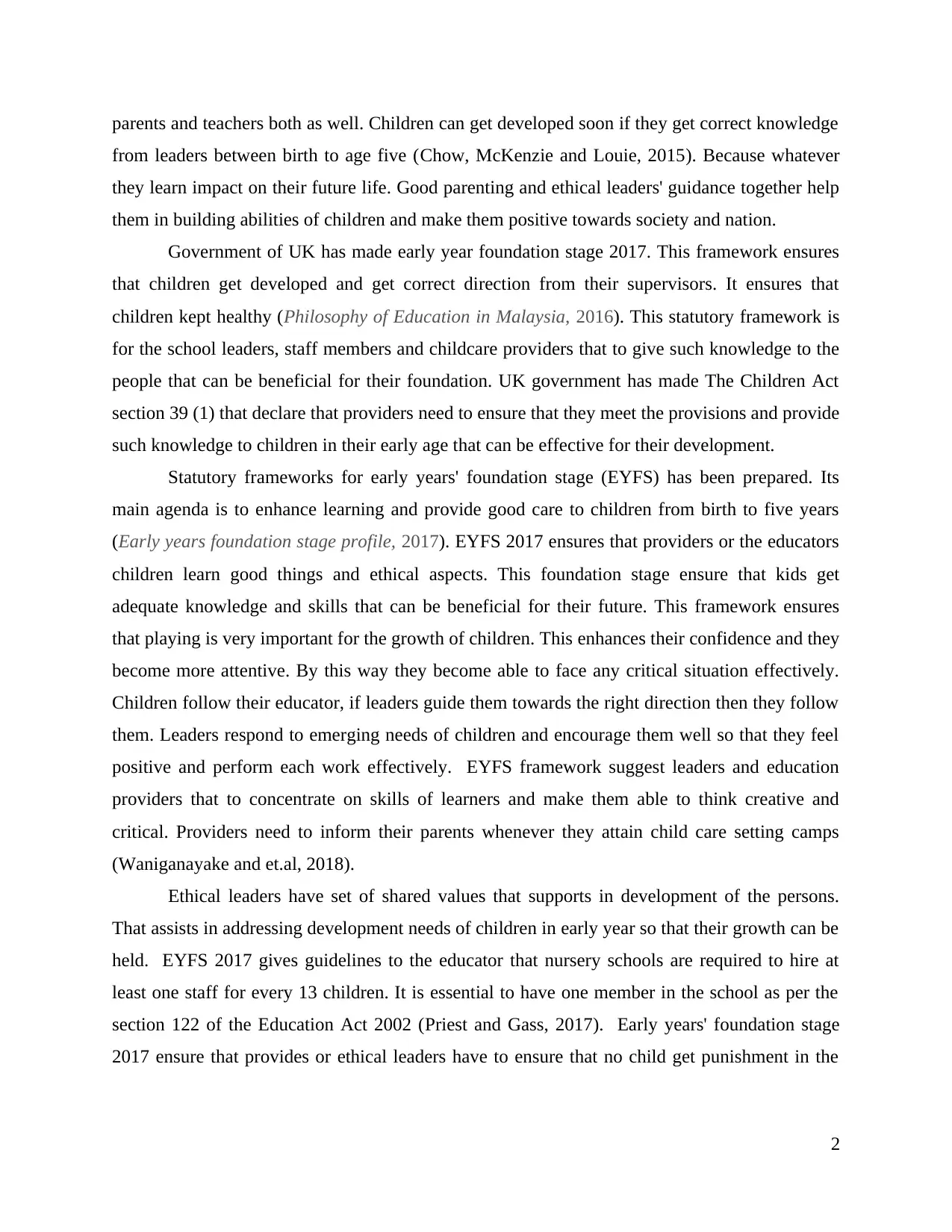
parents and teachers both as well. Children can get developed soon if they get correct knowledge
from leaders between birth to age five (Chow, McKenzie and Louie, 2015). Because whatever
they learn impact on their future life. Good parenting and ethical leaders' guidance together help
them in building abilities of children and make them positive towards society and nation.
Government of UK has made early year foundation stage 2017. This framework ensures
that children get developed and get correct direction from their supervisors. It ensures that
children kept healthy (Philosophy of Education in Malaysia, 2016). This statutory framework is
for the school leaders, staff members and childcare providers that to give such knowledge to the
people that can be beneficial for their foundation. UK government has made The Children Act
section 39 (1) that declare that providers need to ensure that they meet the provisions and provide
such knowledge to children in their early age that can be effective for their development.
Statutory frameworks for early years' foundation stage (EYFS) has been prepared. Its
main agenda is to enhance learning and provide good care to children from birth to five years
(Early years foundation stage profile, 2017). EYFS 2017 ensures that providers or the educators
children learn good things and ethical aspects. This foundation stage ensure that kids get
adequate knowledge and skills that can be beneficial for their future. This framework ensures
that playing is very important for the growth of children. This enhances their confidence and they
become more attentive. By this way they become able to face any critical situation effectively.
Children follow their educator, if leaders guide them towards the right direction then they follow
them. Leaders respond to emerging needs of children and encourage them well so that they feel
positive and perform each work effectively. EYFS framework suggest leaders and education
providers that to concentrate on skills of learners and make them able to think creative and
critical. Providers need to inform their parents whenever they attain child care setting camps
(Waniganayake and et.al, 2018).
Ethical leaders have set of shared values that supports in development of the persons.
That assists in addressing development needs of children in early year so that their growth can be
held. EYFS 2017 gives guidelines to the educator that nursery schools are required to hire at
least one staff for every 13 children. It is essential to have one member in the school as per the
section 122 of the Education Act 2002 (Priest and Gass, 2017). Early years' foundation stage
2017 ensure that provides or ethical leaders have to ensure that no child get punishment in the
2
from leaders between birth to age five (Chow, McKenzie and Louie, 2015). Because whatever
they learn impact on their future life. Good parenting and ethical leaders' guidance together help
them in building abilities of children and make them positive towards society and nation.
Government of UK has made early year foundation stage 2017. This framework ensures
that children get developed and get correct direction from their supervisors. It ensures that
children kept healthy (Philosophy of Education in Malaysia, 2016). This statutory framework is
for the school leaders, staff members and childcare providers that to give such knowledge to the
people that can be beneficial for their foundation. UK government has made The Children Act
section 39 (1) that declare that providers need to ensure that they meet the provisions and provide
such knowledge to children in their early age that can be effective for their development.
Statutory frameworks for early years' foundation stage (EYFS) has been prepared. Its
main agenda is to enhance learning and provide good care to children from birth to five years
(Early years foundation stage profile, 2017). EYFS 2017 ensures that providers or the educators
children learn good things and ethical aspects. This foundation stage ensure that kids get
adequate knowledge and skills that can be beneficial for their future. This framework ensures
that playing is very important for the growth of children. This enhances their confidence and they
become more attentive. By this way they become able to face any critical situation effectively.
Children follow their educator, if leaders guide them towards the right direction then they follow
them. Leaders respond to emerging needs of children and encourage them well so that they feel
positive and perform each work effectively. EYFS framework suggest leaders and education
providers that to concentrate on skills of learners and make them able to think creative and
critical. Providers need to inform their parents whenever they attain child care setting camps
(Waniganayake and et.al, 2018).
Ethical leaders have set of shared values that supports in development of the persons.
That assists in addressing development needs of children in early year so that their growth can be
held. EYFS 2017 gives guidelines to the educator that nursery schools are required to hire at
least one staff for every 13 children. It is essential to have one member in the school as per the
section 122 of the Education Act 2002 (Priest and Gass, 2017). Early years' foundation stage
2017 ensure that provides or ethical leaders have to ensure that no child get punishment in the
2
Paraphrase This Document
Need a fresh take? Get an instant paraphrase of this document with our AI Paraphraser
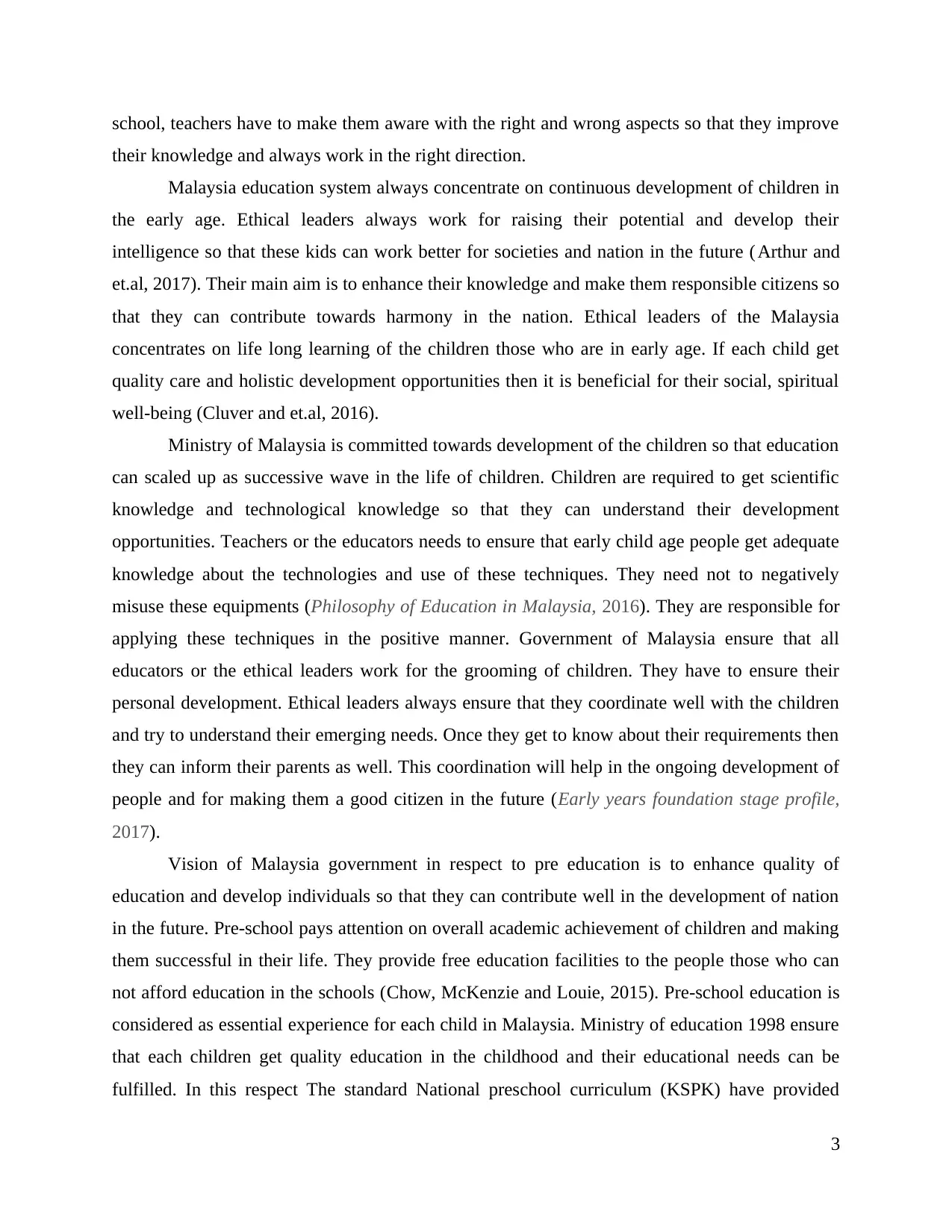
school, teachers have to make them aware with the right and wrong aspects so that they improve
their knowledge and always work in the right direction.
Malaysia education system always concentrate on continuous development of children in
the early age. Ethical leaders always work for raising their potential and develop their
intelligence so that these kids can work better for societies and nation in the future ( Arthur and
et.al, 2017). Their main aim is to enhance their knowledge and make them responsible citizens so
that they can contribute towards harmony in the nation. Ethical leaders of the Malaysia
concentrates on life long learning of the children those who are in early age. If each child get
quality care and holistic development opportunities then it is beneficial for their social, spiritual
well-being (Cluver and et.al, 2016).
Ministry of Malaysia is committed towards development of the children so that education
can scaled up as successive wave in the life of children. Children are required to get scientific
knowledge and technological knowledge so that they can understand their development
opportunities. Teachers or the educators needs to ensure that early child age people get adequate
knowledge about the technologies and use of these techniques. They need not to negatively
misuse these equipments (Philosophy of Education in Malaysia, 2016). They are responsible for
applying these techniques in the positive manner. Government of Malaysia ensure that all
educators or the ethical leaders work for the grooming of children. They have to ensure their
personal development. Ethical leaders always ensure that they coordinate well with the children
and try to understand their emerging needs. Once they get to know about their requirements then
they can inform their parents as well. This coordination will help in the ongoing development of
people and for making them a good citizen in the future (Early years foundation stage profile,
2017).
Vision of Malaysia government in respect to pre education is to enhance quality of
education and develop individuals so that they can contribute well in the development of nation
in the future. Pre-school pays attention on overall academic achievement of children and making
them successful in their life. They provide free education facilities to the people those who can
not afford education in the schools (Chow, McKenzie and Louie, 2015). Pre-school education is
considered as essential experience for each child in Malaysia. Ministry of education 1998 ensure
that each children get quality education in the childhood and their educational needs can be
fulfilled. In this respect The standard National preschool curriculum (KSPK) have provided
3
their knowledge and always work in the right direction.
Malaysia education system always concentrate on continuous development of children in
the early age. Ethical leaders always work for raising their potential and develop their
intelligence so that these kids can work better for societies and nation in the future ( Arthur and
et.al, 2017). Their main aim is to enhance their knowledge and make them responsible citizens so
that they can contribute towards harmony in the nation. Ethical leaders of the Malaysia
concentrates on life long learning of the children those who are in early age. If each child get
quality care and holistic development opportunities then it is beneficial for their social, spiritual
well-being (Cluver and et.al, 2016).
Ministry of Malaysia is committed towards development of the children so that education
can scaled up as successive wave in the life of children. Children are required to get scientific
knowledge and technological knowledge so that they can understand their development
opportunities. Teachers or the educators needs to ensure that early child age people get adequate
knowledge about the technologies and use of these techniques. They need not to negatively
misuse these equipments (Philosophy of Education in Malaysia, 2016). They are responsible for
applying these techniques in the positive manner. Government of Malaysia ensure that all
educators or the ethical leaders work for the grooming of children. They have to ensure their
personal development. Ethical leaders always ensure that they coordinate well with the children
and try to understand their emerging needs. Once they get to know about their requirements then
they can inform their parents as well. This coordination will help in the ongoing development of
people and for making them a good citizen in the future (Early years foundation stage profile,
2017).
Vision of Malaysia government in respect to pre education is to enhance quality of
education and develop individuals so that they can contribute well in the development of nation
in the future. Pre-school pays attention on overall academic achievement of children and making
them successful in their life. They provide free education facilities to the people those who can
not afford education in the schools (Chow, McKenzie and Louie, 2015). Pre-school education is
considered as essential experience for each child in Malaysia. Ministry of education 1998 ensure
that each children get quality education in the childhood and their educational needs can be
fulfilled. In this respect The standard National preschool curriculum (KSPK) have provided
3
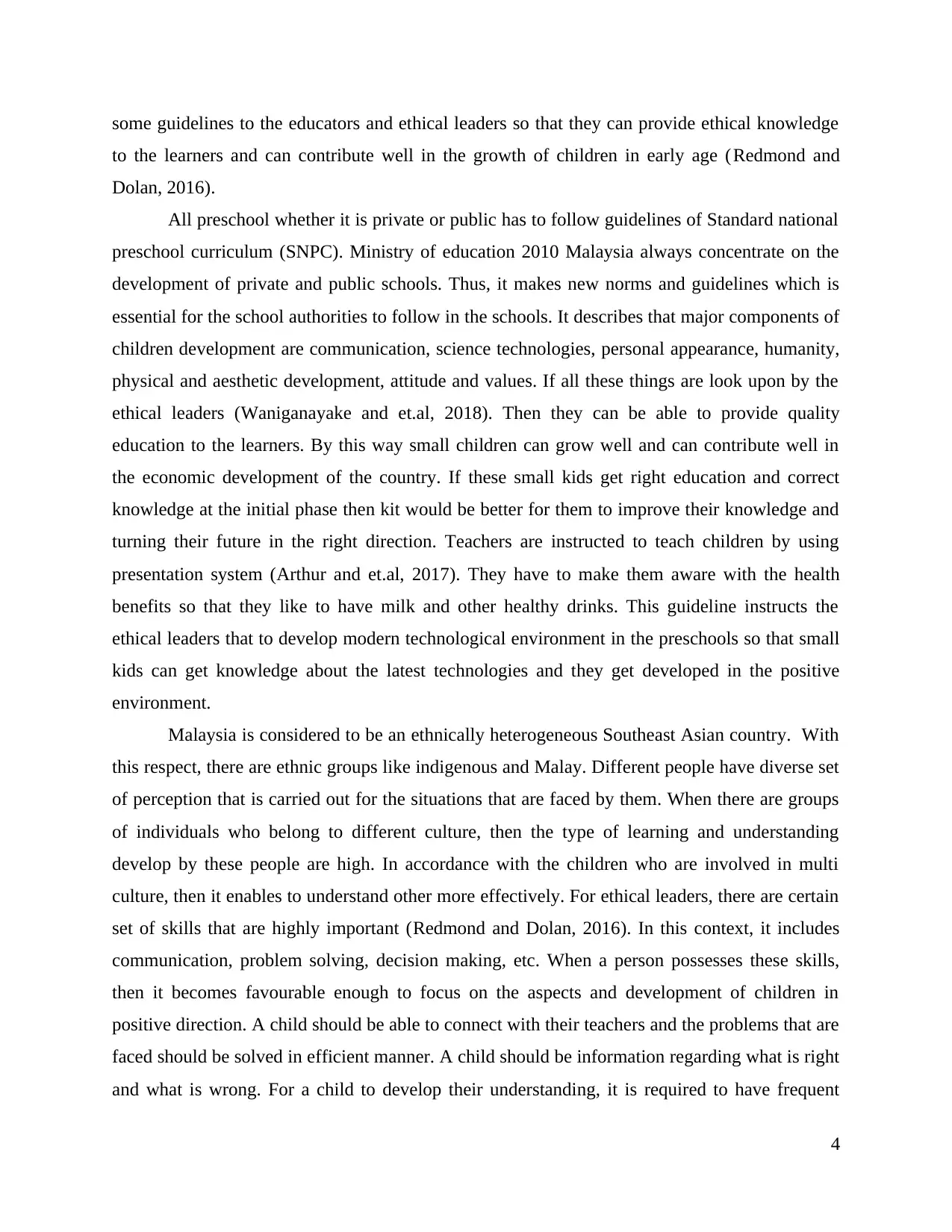
some guidelines to the educators and ethical leaders so that they can provide ethical knowledge
to the learners and can contribute well in the growth of children in early age (Redmond and
Dolan, 2016).
All preschool whether it is private or public has to follow guidelines of Standard national
preschool curriculum (SNPC). Ministry of education 2010 Malaysia always concentrate on the
development of private and public schools. Thus, it makes new norms and guidelines which is
essential for the school authorities to follow in the schools. It describes that major components of
children development are communication, science technologies, personal appearance, humanity,
physical and aesthetic development, attitude and values. If all these things are look upon by the
ethical leaders (Waniganayake and et.al, 2018). Then they can be able to provide quality
education to the learners. By this way small children can grow well and can contribute well in
the economic development of the country. If these small kids get right education and correct
knowledge at the initial phase then kit would be better for them to improve their knowledge and
turning their future in the right direction. Teachers are instructed to teach children by using
presentation system (Arthur and et.al, 2017). They have to make them aware with the health
benefits so that they like to have milk and other healthy drinks. This guideline instructs the
ethical leaders that to develop modern technological environment in the preschools so that small
kids can get knowledge about the latest technologies and they get developed in the positive
environment.
Malaysia is considered to be an ethnically heterogeneous Southeast Asian country. With
this respect, there are ethnic groups like indigenous and Malay. Different people have diverse set
of perception that is carried out for the situations that are faced by them. When there are groups
of individuals who belong to different culture, then the type of learning and understanding
develop by these people are high. In accordance with the children who are involved in multi
culture, then it enables to understand other more effectively. For ethical leaders, there are certain
set of skills that are highly important (Redmond and Dolan, 2016). In this context, it includes
communication, problem solving, decision making, etc. When a person possesses these skills,
then it becomes favourable enough to focus on the aspects and development of children in
positive direction. A child should be able to connect with their teachers and the problems that are
faced should be solved in efficient manner. A child should be information regarding what is right
and what is wrong. For a child to develop their understanding, it is required to have frequent
4
to the learners and can contribute well in the growth of children in early age (Redmond and
Dolan, 2016).
All preschool whether it is private or public has to follow guidelines of Standard national
preschool curriculum (SNPC). Ministry of education 2010 Malaysia always concentrate on the
development of private and public schools. Thus, it makes new norms and guidelines which is
essential for the school authorities to follow in the schools. It describes that major components of
children development are communication, science technologies, personal appearance, humanity,
physical and aesthetic development, attitude and values. If all these things are look upon by the
ethical leaders (Waniganayake and et.al, 2018). Then they can be able to provide quality
education to the learners. By this way small children can grow well and can contribute well in
the economic development of the country. If these small kids get right education and correct
knowledge at the initial phase then kit would be better for them to improve their knowledge and
turning their future in the right direction. Teachers are instructed to teach children by using
presentation system (Arthur and et.al, 2017). They have to make them aware with the health
benefits so that they like to have milk and other healthy drinks. This guideline instructs the
ethical leaders that to develop modern technological environment in the preschools so that small
kids can get knowledge about the latest technologies and they get developed in the positive
environment.
Malaysia is considered to be an ethnically heterogeneous Southeast Asian country. With
this respect, there are ethnic groups like indigenous and Malay. Different people have diverse set
of perception that is carried out for the situations that are faced by them. When there are groups
of individuals who belong to different culture, then the type of learning and understanding
develop by these people are high. In accordance with the children who are involved in multi
culture, then it enables to understand other more effectively. For ethical leaders, there are certain
set of skills that are highly important (Redmond and Dolan, 2016). In this context, it includes
communication, problem solving, decision making, etc. When a person possesses these skills,
then it becomes favourable enough to focus on the aspects and development of children in
positive direction. A child should be able to connect with their teachers and the problems that are
faced should be solved in efficient manner. A child should be information regarding what is right
and what is wrong. For a child to develop their understanding, it is required to have frequent
4
⊘ This is a preview!⊘
Do you want full access?
Subscribe today to unlock all pages.

Trusted by 1+ million students worldwide
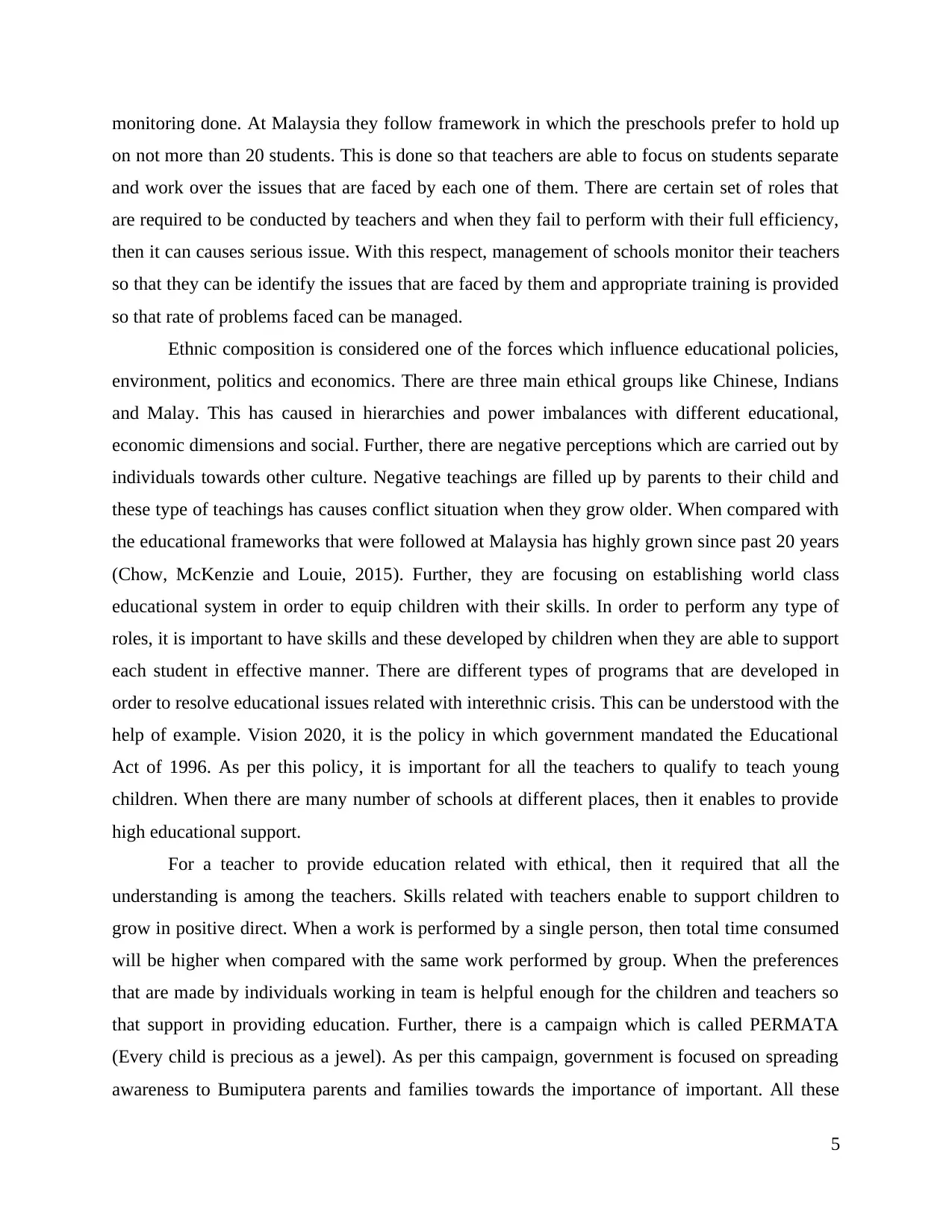
monitoring done. At Malaysia they follow framework in which the preschools prefer to hold up
on not more than 20 students. This is done so that teachers are able to focus on students separate
and work over the issues that are faced by each one of them. There are certain set of roles that
are required to be conducted by teachers and when they fail to perform with their full efficiency,
then it can causes serious issue. With this respect, management of schools monitor their teachers
so that they can be identify the issues that are faced by them and appropriate training is provided
so that rate of problems faced can be managed.
Ethnic composition is considered one of the forces which influence educational policies,
environment, politics and economics. There are three main ethical groups like Chinese, Indians
and Malay. This has caused in hierarchies and power imbalances with different educational,
economic dimensions and social. Further, there are negative perceptions which are carried out by
individuals towards other culture. Negative teachings are filled up by parents to their child and
these type of teachings has causes conflict situation when they grow older. When compared with
the educational frameworks that were followed at Malaysia has highly grown since past 20 years
(Chow, McKenzie and Louie, 2015). Further, they are focusing on establishing world class
educational system in order to equip children with their skills. In order to perform any type of
roles, it is important to have skills and these developed by children when they are able to support
each student in effective manner. There are different types of programs that are developed in
order to resolve educational issues related with interethnic crisis. This can be understood with the
help of example. Vision 2020, it is the policy in which government mandated the Educational
Act of 1996. As per this policy, it is important for all the teachers to qualify to teach young
children. When there are many number of schools at different places, then it enables to provide
high educational support.
For a teacher to provide education related with ethical, then it required that all the
understanding is among the teachers. Skills related with teachers enable to support children to
grow in positive direct. When a work is performed by a single person, then total time consumed
will be higher when compared with the same work performed by group. When the preferences
that are made by individuals working in team is helpful enough for the children and teachers so
that support in providing education. Further, there is a campaign which is called PERMATA
(Every child is precious as a jewel). As per this campaign, government is focused on spreading
awareness to Bumiputera parents and families towards the importance of important. All these
5
on not more than 20 students. This is done so that teachers are able to focus on students separate
and work over the issues that are faced by each one of them. There are certain set of roles that
are required to be conducted by teachers and when they fail to perform with their full efficiency,
then it can causes serious issue. With this respect, management of schools monitor their teachers
so that they can be identify the issues that are faced by them and appropriate training is provided
so that rate of problems faced can be managed.
Ethnic composition is considered one of the forces which influence educational policies,
environment, politics and economics. There are three main ethical groups like Chinese, Indians
and Malay. This has caused in hierarchies and power imbalances with different educational,
economic dimensions and social. Further, there are negative perceptions which are carried out by
individuals towards other culture. Negative teachings are filled up by parents to their child and
these type of teachings has causes conflict situation when they grow older. When compared with
the educational frameworks that were followed at Malaysia has highly grown since past 20 years
(Chow, McKenzie and Louie, 2015). Further, they are focusing on establishing world class
educational system in order to equip children with their skills. In order to perform any type of
roles, it is important to have skills and these developed by children when they are able to support
each student in effective manner. There are different types of programs that are developed in
order to resolve educational issues related with interethnic crisis. This can be understood with the
help of example. Vision 2020, it is the policy in which government mandated the Educational
Act of 1996. As per this policy, it is important for all the teachers to qualify to teach young
children. When there are many number of schools at different places, then it enables to provide
high educational support.
For a teacher to provide education related with ethical, then it required that all the
understanding is among the teachers. Skills related with teachers enable to support children to
grow in positive direct. When a work is performed by a single person, then total time consumed
will be higher when compared with the same work performed by group. When the preferences
that are made by individuals working in team is helpful enough for the children and teachers so
that support in providing education. Further, there is a campaign which is called PERMATA
(Every child is precious as a jewel). As per this campaign, government is focused on spreading
awareness to Bumiputera parents and families towards the importance of important. All these
5
Paraphrase This Document
Need a fresh take? Get an instant paraphrase of this document with our AI Paraphraser
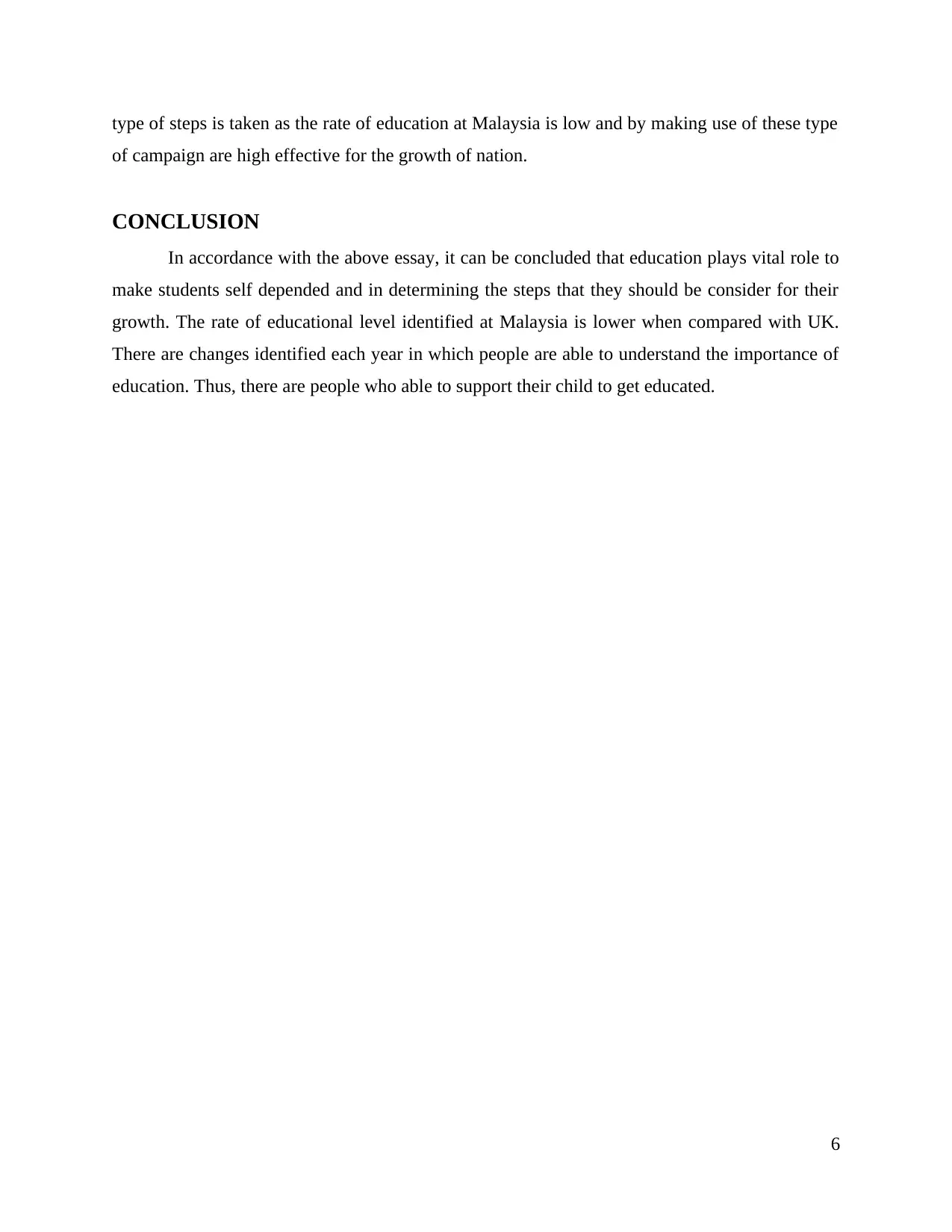
type of steps is taken as the rate of education at Malaysia is low and by making use of these type
of campaign are high effective for the growth of nation.
CONCLUSION
In accordance with the above essay, it can be concluded that education plays vital role to
make students self depended and in determining the steps that they should be consider for their
growth. The rate of educational level identified at Malaysia is lower when compared with UK.
There are changes identified each year in which people are able to understand the importance of
education. Thus, there are people who able to support their child to get educated.
6
of campaign are high effective for the growth of nation.
CONCLUSION
In accordance with the above essay, it can be concluded that education plays vital role to
make students self depended and in determining the steps that they should be consider for their
growth. The rate of educational level identified at Malaysia is lower when compared with UK.
There are changes identified each year in which people are able to understand the importance of
education. Thus, there are people who able to support their child to get educated.
6
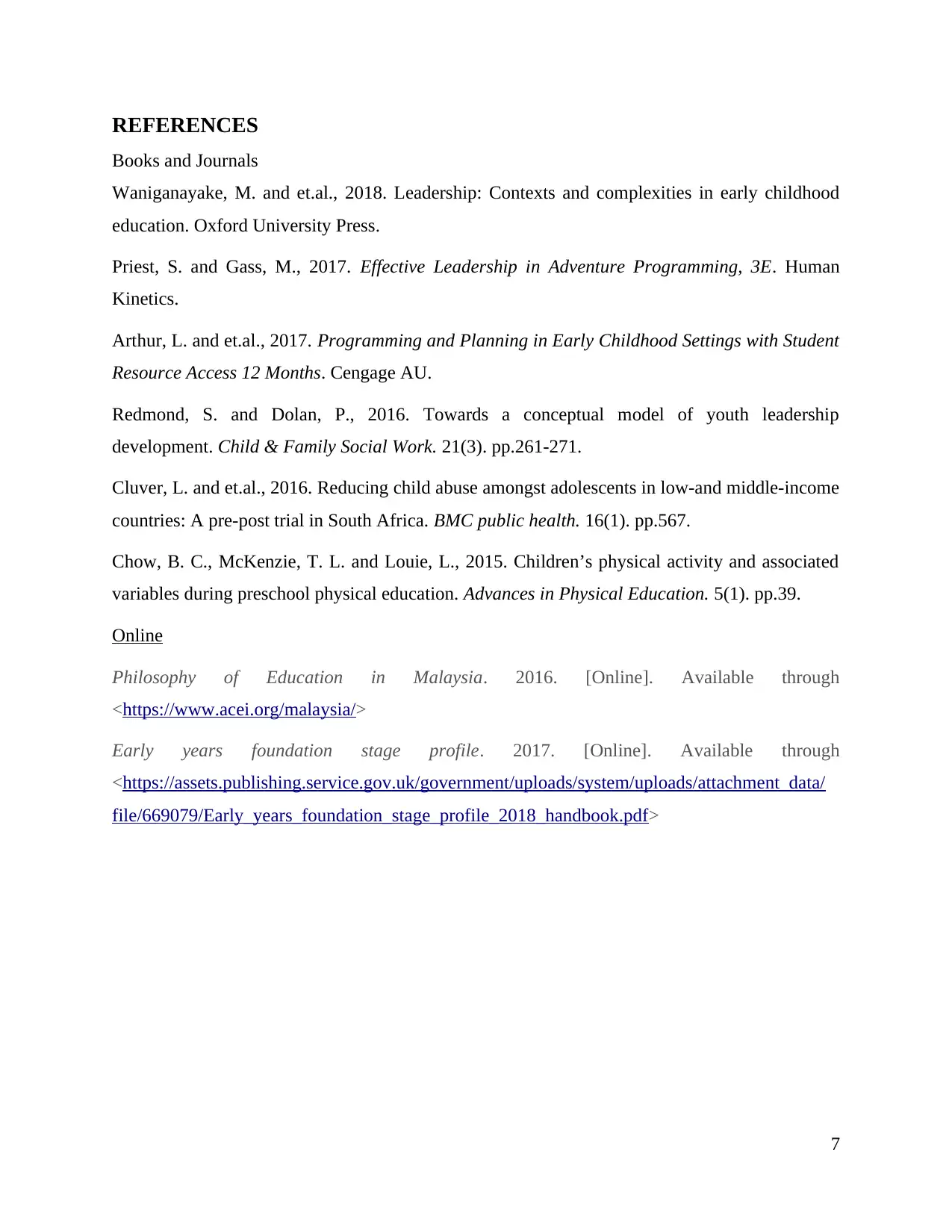
REFERENCES
Books and Journals
Waniganayake, M. and et.al., 2018. Leadership: Contexts and complexities in early childhood
education. Oxford University Press.
Priest, S. and Gass, M., 2017. Effective Leadership in Adventure Programming, 3E. Human
Kinetics.
Arthur, L. and et.al., 2017. Programming and Planning in Early Childhood Settings with Student
Resource Access 12 Months. Cengage AU.
Redmond, S. and Dolan, P., 2016. Towards a conceptual model of youth leadership
development. Child & Family Social Work. 21(3). pp.261-271.
Cluver, L. and et.al., 2016. Reducing child abuse amongst adolescents in low-and middle-income
countries: A pre-post trial in South Africa. BMC public health. 16(1). pp.567.
Chow, B. C., McKenzie, T. L. and Louie, L., 2015. Children’s physical activity and associated
variables during preschool physical education. Advances in Physical Education. 5(1). pp.39.
Online
Philosophy of Education in Malaysia. 2016. [Online]. Available through
<https://www.acei.org/malaysia/>
Early years foundation stage profile. 2017. [Online]. Available through
<https://assets.publishing.service.gov.uk/government/uploads/system/uploads/attachment_data/
file/669079/Early_years_foundation_stage_profile_2018_handbook.pdf>
7
Books and Journals
Waniganayake, M. and et.al., 2018. Leadership: Contexts and complexities in early childhood
education. Oxford University Press.
Priest, S. and Gass, M., 2017. Effective Leadership in Adventure Programming, 3E. Human
Kinetics.
Arthur, L. and et.al., 2017. Programming and Planning in Early Childhood Settings with Student
Resource Access 12 Months. Cengage AU.
Redmond, S. and Dolan, P., 2016. Towards a conceptual model of youth leadership
development. Child & Family Social Work. 21(3). pp.261-271.
Cluver, L. and et.al., 2016. Reducing child abuse amongst adolescents in low-and middle-income
countries: A pre-post trial in South Africa. BMC public health. 16(1). pp.567.
Chow, B. C., McKenzie, T. L. and Louie, L., 2015. Children’s physical activity and associated
variables during preschool physical education. Advances in Physical Education. 5(1). pp.39.
Online
Philosophy of Education in Malaysia. 2016. [Online]. Available through
<https://www.acei.org/malaysia/>
Early years foundation stage profile. 2017. [Online]. Available through
<https://assets.publishing.service.gov.uk/government/uploads/system/uploads/attachment_data/
file/669079/Early_years_foundation_stage_profile_2018_handbook.pdf>
7
⊘ This is a preview!⊘
Do you want full access?
Subscribe today to unlock all pages.

Trusted by 1+ million students worldwide

8
1 out of 10
Related Documents
Your All-in-One AI-Powered Toolkit for Academic Success.
+13062052269
info@desklib.com
Available 24*7 on WhatsApp / Email
![[object Object]](/_next/static/media/star-bottom.7253800d.svg)
Unlock your academic potential
Copyright © 2020–2026 A2Z Services. All Rights Reserved. Developed and managed by ZUCOL.





